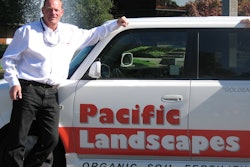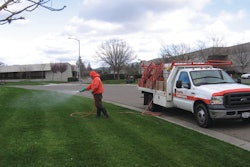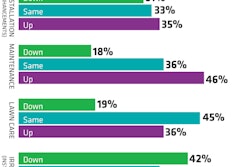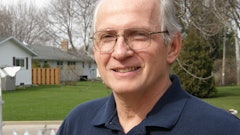
Like most landscape contractors, Darryl Orr and Dave Penry have faced their share of ups and downs. Through them all, this duo has never compromised the principles upon which its company was founded: pride in its passion for landscaping, integrity above profits, 100% accountability, respect in the community, flexibility and fun.
These principles have helped Pacific Landscapes build a near $4 million company in the North Bay community of Sebastopol, CA. The company has been recognized on numerous occasions for its leadership in sustainable landscaping and for being one of the best employers in the San Francisco North Bay area.
It's our time
Orr and Penry first came together to found Pacific Landscapes in 2000. The two had worked together for the previous 15 years at another landscape company. After that company found itself in the middle of the 1998 LandCare consolidation, Orr and Penry decided it was time to branch out on their own.
Then the economy softened. "We thought it would be bulletproof because we had the tech and wine industries here," Penry recalls. "We found out that it wasn't. We started operating in October 2000, and then the 2001 recession hit. Our first couple of years were tough."
But by 2003 the housing and commercial real estate markets started going wild—and Pacific Landscapes' account base grew quickly. By 2007 the company was grossing $3.79 million and employing 70. Then the 2009 recession hit. "We didn't have much construction work to speak of in 2009," Orr tells. Fortunately, only 10-15% of Pacific Landscapes' total revenue was tied to new landscape installation.
Since then Pacific Landscapes has focused on expanding its maintenance base. Now a little more than 70% of total revenue comes from monthly maintenance contracts; the rest comes from maintenance-driven landscape enhancements and irrigation upgrades. Sales have eclipsed the $3.8 million mark—an all-time high—and the company employs 75 (60 year round), also an all-time high.
Creating a great place to work
Orr and Penry take great pride in the fact that their company is a four-time recipient of the North Bay Business Journal's "Best Places to Work" award. "When you consider that the North Bay is filled with employers like medical research facilities and tele-com companies that offer huge benefits, the fact that a smaller company like ours has won this award four times is a great honor," Penry says.
"The majority of our employees have been with us since the beginning," adds Orr. "Looking specifically at our full-time roster, the average tenure is seven years. We always encourage personal growth. I think back to when I was working for that other company. The fact that they encouraged my personal growth was why I was so loyal to them for 15 years. That’s what we want to do now for the employees of our company.”
One of Pacific Landscapes' six founding principles, 100% accountability, has had a big impact on the owners' ability to create a great place to work. As one employee stated: “I feel a spirit of cooperation that I don’t think I’ve come across until working here. It is open minded, open communication. There is a team-oriented approach to solving problems.”
What is 100% accountability? "If you have a problem, you fix it as soon as humanly possibly," Penry explains. For example, if an employee picked up his paycheck and there’s an error, you fix it that afternoon rather than make him wait three days. If a customer calls with a problem at 3:30 p.m., make a call to a crew and try to resolve it right away, or at the very least first thing the next morning. "We'll send a tech out at midnight if there's a stuck irrigation valve or something like that," Orr adds.
“Now, 100% accountability isn’t always comfortable for employees,” Penry points out. “So we try to avoid saying things like ‘you are wrong’ or ‘you are at fault.’ Those are negative and attack the individual too much on a personal level. We like to use the term ‘responsibility,’ and it's our responsibility as the employer to help each of our employees meet their responsibilities."
Transitioning to organics
A good example of how the philosophy of 100% accountability applies to everyone in the company, including the owners, is the recent transition to organic-based lawn care. Pacific Landscapes completely replaced conventional synthetic fertilizers with an organic soil fertility management program in 2009. The switch was offered across the board to all clients at no additional charge. The company has since taken steps to also eliminate the use of synthetic pesticides.
While most clients seemed to take quite well to the change, employees didn't completely embrace it at first. It required a very different approach which veteran lawn care techs weren't used to.
Additional labor is involved when using organic products. You need to put down about twice as much product. That also means you have a lot more to load into the truck each morning. Plus, most organic products don't smell the best. "We told our techs that they now had to go out into the field and spread this dusty, smelly product made out of bone meal and blood meal," Orr tells. "It took a real educational effort to get everybody on board."
Orr accepted that responsibility, going out into the field himself to observe techs and the challenges they were facing. He quickly learned that he needed to find products that were easier to work with. That's where Malcolm Morrison comes in.
New approach to soil management
Morrison is Pacific Landscapes' in-house soil biologist. His company, Sonoma Biologics, manufactures and supplies Pacific Landscapes with organic-based fertilizers, mineral supplements, compost tea, bio-stimulants and biology food sources. Many of the ingredients for these products are sourced within 100 miles, greatly reducing freight costs. The result is a lineup of organic-based products that are comparable in price to synthetics.
The products, none of which contain manures, are also highly effective. Rather than deliver plant-ready nutrients that create sterile soil, the products are designed to improve the health of the soil by balancing mineral ratios and promoting healthy biology. That helps relieve soil compaction, which in turn promotes root growth and water-retention capacity.
"Once we achieve the right calcium/magnesium ratio (Ca:Mg), the pore space begins to open up in the soil," Orr says. "Then we begin applications of compost tea to really bring that soil back to life."
There is definitely a transition period that must take place when converting a property to an organic-based program. Orr says it can be upwards of five years. Morrison explains, "When you put organic fertilizer into the soil, plants can't do anything with it because they are dependent on the microbial mass in the soil to render the fertilizer as plant-available. A lawn that has been maintained for years with synthetics doesn't have any microbial mass."
Pacific Landscapes has addressed this by applying food sources such as fish hydrolysate, in addition to humic and fulvic acids, early on in the conversion process. This helps accelerate nutrient cycling and speed up the conversion. (See "This Project Proves It" for more on how the soil fertility program works.)
Shifting to a soil fertility management approach has produced an important side benefit: a reduction in water usage. Pacific Landscapes has long been a leader in responsible landscape irrigation and water conservation. Now the company can take it one step further.
The first step in responsible irrigation, according to Orr, is the hardware itself. Pacific Landscapes uses low-precipitation MP spray heads and smart controllers. The second step is effective management of those products. "A smart controller is only as smart as the person putting the inputs into it," Orr says with a laugh. Pacific Landscapes holds numerous irrigation-related certifications, including: Certified Landscape Irrigation Auditor and Certified Landscape Irrigation Designer (Irrigation Association), Qualified Water Efficient Landscaper (Sonoma County Water Agency), Water Efficient Landscaper (Marin Municipal Water District), and Bay-Friendly Qualified Landscape Professionals (Bay-Friendly Coalition).
The third step, soil management, is what sets Pacific Landscapes apart from other landscape contractors. By increasing soil pore space from 15% to 50%, considerably more rainwater is put back into the groundwater system. "We don't have to irrigate as often," Orr points out. "We can start up later into the spring, maybe June 1 instead of April 1." This all translates into significant water savings for clients.
The right thing to do
Orr says he first looked at making the switch to organics when fertilizer prices nearly doubled in 2008. The price gap between organics and synthetics closed a bit, making the changeover more feasible from a financial standpoint. Additionally, this was the same time the economy started to weaken. Orr and Penry were looking for a unique niche—some reason to tell clients that they needed to stay with them.
It's worked, and has even resulted in new business. "When we'd sent out a press release about our switch to an organic-based soil fertility program, one major property manager emailed seven other managers who worked for her, applauding our efforts and telling them to put us on their bid lists," Orr says. "Another client hired us for 30% more than they were paying their existing contractor because they were doing an environmental makeover and knew what we were capable of."
Rising fertilizer prices and a unique marketing hook weren't the only reasons Pacific Landscapes switched to organics, though. "The main reason was because we simply wanted to lead the industry in sustainability," Penry says. Looking back at the owners' six founding principles, it's not hard to see how they came to that decision.


![Doosan Bobcat Wacker Neuson Stack 2ec Js Pb V6e[1]](https://img.greenindustrypros.com/mindful/acbm/workspaces/default/uploads/2025/12/doosan-bobcat-wacker-neuson-stack2ecjspbv6e1.CPyyz8ubHn.png?auto=format%2Ccompress&bg=fff&fill-color=fff&fit=fill&h=100&q=70&w=100)








![Doosan Bobcat Wacker Neuson Stack 2ec Js Pb V6e[1]](https://img.greenindustrypros.com/mindful/acbm/workspaces/default/uploads/2025/12/doosan-bobcat-wacker-neuson-stack2ecjspbv6e1.CPyyz8ubHn.png?ar=16%3A9&auto=format%2Ccompress&bg=fff&fill-color=fff&fit=fill&h=135&q=70&w=240)








